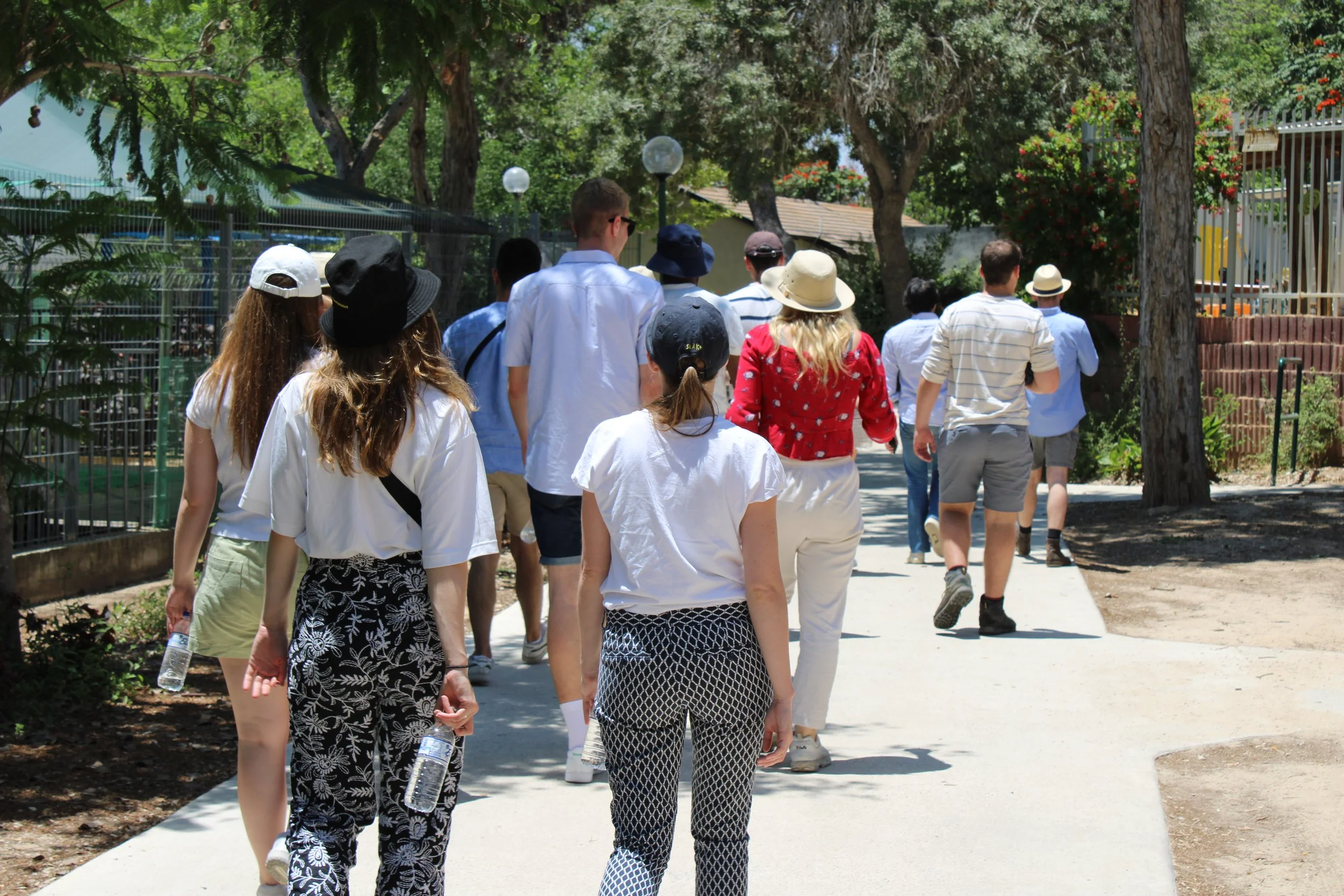A portrait of Kibbutz Kfar Aza, then and now
Ella Shattock, a participant in a Pinsker Centre trip to Israel in 2022, reflects on her visit to the South of Israel.
The first day of July in the year 2022.
It is morning in Tel Aviv. The revolving door of Grand Beach Hotel with its wide spiral staircase beside jungle-like plants, colourful chairs, and Shabbat elevator, disappears into the traffic. Today we are headed for the towns and villages in Southern Israel that face regular rocket bombardment from the Gaza Strip.
The name Tel Aviv translates in English as ‘Springtime hill’. The Hebrew ‘Tel’, however, references a particular kind of hill: ‘an ancient mound built from many layers of successive civilisations’. Tel Aviv may be young for a major city, founded in 1909 on windswept sand dunes north of Jaffa, but it carries the legacy of ancient civilisations reborn anew like the spring.
The landscape is grassy and flat, no fabled ‘tel’ in sight. Skyscrapers stand against pastel blue. Smaller Bauhaus style buildings, boxy and straight-lined, are a creamy shade that looks almost pink in midmorning light. A shirtless man sips coffee on his balcony above an oversized Israeli flag and brightly patterned towel, both flapping.
A little Suzuki beeps as it overtakes us. We are zipping along the motorway now. As the suburbs of Sderot take shape, it appears the boxy architecture I had noticed in Tel Aviv is becoming even more pronounced. Our guide explains the windowless extensions jutting from the nearby apartment buildings are bomb shelters.
Stopping briefly in Sderot town to use the toilet, our guide Yoni grins and gestures to the closest white concrete box in the car park. ‘That’s where we’ll run to,’ he says, ‘but it’s okay, I’ve booked the rockets for 11am’. Dark humour, it seems, is an Israeli trademark.
An elderly couple crosses the road with a shopping trolley. The people of Sderot are sitting ducks. They have just ten seconds to run to a shelter when the siren goes off. I struggle to see the shuffling feet of this old man and woman being able to move that quickly.
Clambering back aboard the bus, we continue through Sderot and press onwards to Kfar Aza, a kibbutz whose outer fence is less than a mile from the Gaza Strip border.
We turn into the streets of a leafy neighbourhood. The scenery is a stark contrast to the urban centres of Gaza City and Ashkelon observed from Black Arrow Lookout Point earlier in the day. We pass bus shelters and bomb shelters, many wrapped in colourful children’s murals: rainbows, geometric patterns, and stick figure families holding hands. Children race for a ball on a basketball pitch. On the fern-swathed porches of almost all these houses are yellow slides and red plastic swings. We park under a large tree and disembark.
Under the tree, whose trunk is surrounded by a circular stone seat, we are greeted by a short woman with close-cropped dark hair and glasses. Dressed in white three-quarter-length trousers and a flowery short-sleeved shirt, she smiles and introduces herself as Chen, a ‘daughter of Kibbutz Kfar Aza’.
My attention is drawn to a pair of baby’s shoes left unattended on the nearby playground bench, presumably left by a parent in the flurry of leaving the park and now peacefully awaiting collection. Meanwhile, Chen is gesturing to a child’s purple bike, complete with stabilisers and handlebar streamers, parked neatly and left unlocked at a rack next to the bus stop.
‘This is a safe place for children to grow up,’ she says, ‘our neighbourhood has practically no crime’. I look at the large bomb shelter behind her.
When a small terrier-like dog trundles past, Chen’s eyes light up. ‘Can anyone guess who loves kibbutz life even more than kids? Dogs. We have many dogs here who take themselves for walks.’
Chen walks us to the Kibbutz Community Centre, which is a large building with a courtyard bathed in noon sunshine, not a shadow in sight. By a potted cactus outside the toilets, I approach Chen and tell her that her home feels like paradise. She smiles wistfully, ‘Paradise. Thank you. Yes. But we have had to learn how quickly paradise can become a battlefield.’
The next stop on our tour is Chen’s house, but en route we pass by the Kibbutz nursery. Chen calls it the ‘baby house’. Over the top is a large structure held up by green pillars, almost like a concrete marquee, which acts as a protective cover in case of rocket strikes from Gaza during the nursery school day. I make peekaboo faces at some toddlers over the fence, but they are clearly absorbed in more important playtime activities.
‘When the red alert sirens start’, Chen is saying, ‘we have trained the little ones to stop and raise their hands in the air so that they can be lifted up by an adult and sprinted to a shelter.’ The horror of this image, related in such a matter-of-fact tone, makes me feel strangely numb.
Now seated on Chen’s front porch, we drink iced cucumber water as she opens a big cabinet of rocket fragments. One by one, she hauls them out onto the floor. Some are too heavy for her to lift, so one of our group volunteers to hold them up as she talks.
This is only a selection of the most intact rocket pieces to fall in Kfar Aza. Chen also keeps a pile of shrapnel beneath the avocado tree in her front garden. And yet, the newest additions to her cabinet collection are evidently larger and more sophisticated bits of weaponry. ‘At Kfar Aza, our lives happen in the gaps between escalations’, she says. ‘Terror doesn’t stand still’.
Ending her talk with a personal anecdote, Chen tells the group how much she loves being an aunt. On a recent birthday, she received a crayon drawing from her nephew of a man holding balloons. She produces that picture now, complete with its wobbly strip of blue sky.
Full of pride and praise for the budding young artist, she called her sister to gush. ‘Do you know what gave him the idea for that picture?’ her sister replied. She texted Chen a photo of a red inflatable football tied to a cluster of balloons and strapped to an explosive device. Sent over by Hamas in a recent escalation, it had landed in a field not far from Kfar Aza.
Looking closer at the crayon, I see now that what I had first thought was a red ribbon holding the balloons together is in fact a red ball. The person in the picture is neither Chen nor her nephew, but the IDF soldier who disabled the device.
The choice of a football, Chen says, is no accident; Hamas wanted Israeli children to reach for it. On this particular occasion, no one was hurt, but it feels wrong looking at this squiggly child’s drawing to say no one was harmed.
On the other side of the wall, Chen finishes, she knows there is a Gazan woman, maybe called Hana, who also wants the best for her family. She clings to that hope when things seem at their worst, although she admits that she occasionally loses it.
When she does lose it, she reminds herself of something her son said to her. He was serving in the IDF on board a ship in the north; they used to laugh that he was safer there than he would be at home. She called him during a rocket bombardment and he told her, ‘Haven’t you worked out Mum, the only way that we can solve this is diplomacy.’ If the next generation of Israelis and Palestinians can still speak of diplomacy and peace, Chen thinks that all is not lost.
N. B. The above was written two years ago, in summer 2022. I returned to Israel and to Kfar Aza in August 2023. As of October 7, 2023, following the invasion and massacre carried out by Hamas terrorists, Kibbutz Kfar Aza will never look the same again.
One year ago, on October 7, 2023, Chen was not at home in Kfar Aza. She answered a phone call from her father who had seen rockets fired from Gaza on his early morning walk in the Kibbutz fields. He returned home quickly, and Chen was telling him to get to the safe room when she heard voices speaking Arabic in the background of the call. She was still on the phone when the shooting started.
Thankfully, Chen’s father survived the Hamas massacre at Kfar Aza, as did her siblings, nieces, and nephews. All spent hours hiding, terrified, in safe rooms before their eventual rescue and evacuation. Many were not so lucky. Itai and Hadar Berdichevsky, both thirty, lost their lives. Their last act was to hide their ten-month-old twin boys in a shelter where, approximately fourteen hours later, they were found unharmed by the emergency services. Other horror-filled stories abound.
I left work on Wednesday the 11th of October 2023 to a message from a friend: ‘Kfar Aza is decimated’. When gut-wrenching images started coming through of the burnt wreckage and utter devastation wrought by Hamas on a kibbutz that I once called paradise, my eyes rested on one photo longer than the rest. Hanging in front of the blackened empty shell of a family home, a red plastic baby swing was still attached to the lopsided remains of what used to be a porch.
Speaking on Zoom in a briefing about the situation in Kfar Aza last winter, Chen said that whenever she has been evacuated in previous conflicts, she has always had a home to come back to. This time she is left with rubble. Kibbutz Kfar Aza was built by her aunt and uncle in 1951. Her family have lived there for almost as long as the State of Israel has existed. Now the survivors of October 7th, including Chen and her siblings, have pledged to start rebuilding.
One year on, volunteers have already started working on the gardens; plants will grow again in Kfar Aza, and one day its people will return home too. The term ‘kibbutz’ comes from the Modern Hebrew for ‘gathering’ or ‘collective’. A kibbutz is more than the sum of its buildings. As long as there is a single member left to gather its wreckage, the spirit of Kfar Aza can withstand any atrocity. The people live on, and so will the kibbutz.




